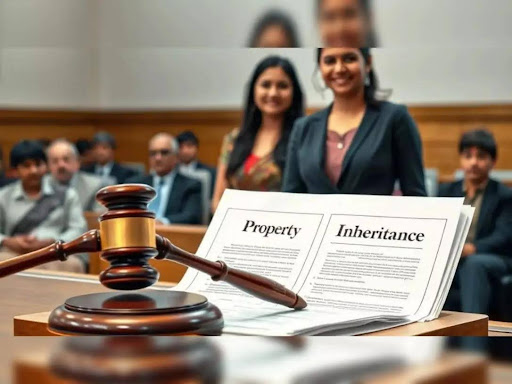In a significant ruling that clarifies inheritance rights under the Hindu Succession Act, 1956, the Delhi High Court has held that grandchildren cannot stake a claim in their grandparents’ property if their parents—who are the legal heirs—are alive.
Also Read: Thinking of Gifting Property to Your Spouse? Here’s What the Tax Rules Say
The Case That Triggered the Judgment
The ruling came in the case of Kritika Jain v. Rakesh Jain and Ors., where a woman filed a partition suit over her late grandfather’s property in Janakpuri, West Delhi. She argued that the property was “ancestral” and that she was entitled to a share of her father’s inherited portion.
Her father, however, contended that the property devolved only upon him and his sister (the deceased’s children) under Section 8 of the Hindu Succession Act, making it his absolute property.
Court’s Key Findings
Justice Purushaindra Kumar Kaurav, rejecting the woman’s claim, made the following observations in his verdict:
- Section 8 of HSA, 1956 applies: If a Hindu male dies without a will (intestate), his property devolves strictly on Class I heirs—widow, sons, daughters, and mother.
- Grandchildren are not Class I heirs: Unless their parent (the son or daughter of the deceased) has already passed away, grandchildren cannot claim a share.
- Inheritance is absolute, not ancestral: The share a child receives from a deceased parent becomes their own property, not a joint family or ancestral property.
The judge concluded that since the woman’s father was alive when her grandfather died, the property devolved solely upon him and his sister. Therefore, the daughter had no rightful claim.
Also Read: Congress Says Govt Gave 1,050 Acres of Bihar Land to Adani for Just ₹1 a Year
Expert Opinions on the Verdict
Legal experts welcomed the decision, emphasizing that it reaffirms the modern interpretation of succession laws.
- No automatic inheritance for grandchildren: Sunil Tyagi, Managing Partner at ZEUS Law Associates, noted that grandchildren can only inherit if their parent (a Class I heir) dies before the grandparent.
- Shift from traditional notions of ancestral property: The Hindu Succession Act, 1956, significantly changed how property devolves, making self-acquired property of the heir absolute.
Also Read: What Is GST on Under‑Construction Property in 2025?
Why This Matters
This ruling serves as a crucial reminder for families:
- Property inherited from parents is treated as personal property of the heir.
- Grandchildren cannot claim a share while their parent (the direct heir) is alive.
- Claims of “ancestral property” must be backed with clear evidence of joint family ownership.
In a significant ruling that clarifies inheritance rights under the Hindu Succession Act, 1956, the Delhi High Court has held that grandchildren cannot stake a claim in their grandparents’ property if their parents—who are the legal heirs—are alive.
Also Read: Thinking of Gifting Property to Your Spouse? Here’s What the Tax Rules Say
The Case That Triggered the Judgment
The ruling came in the case of Kritika Jain v. Rakesh Jain and Ors., where a woman filed a partition suit over her late grandfather’s property in Janakpuri, West Delhi. She argued that the property was “ancestral” and that she was entitled to a share of her father’s inherited portion.
Her father, however, contended that the property devolved only upon him and his sister (the deceased’s children) under Section 8 of the Hindu Succession Act, making it his absolute property.
Court’s Key Findings
Justice Purushaindra Kumar Kaurav, rejecting the woman’s claim, made the following observations in his verdict:
- Section 8 of HSA, 1956 applies: If a Hindu male dies without a will (intestate), his property devolves strictly on Class I heirs—widow, sons, daughters, and mother.
- Grandchildren are not Class I heirs: Unless their parent (the son or daughter of the deceased) has already passed away, grandchildren cannot claim a share.
- Inheritance is absolute, not ancestral: The share a child receives from a deceased parent becomes their own property, not a joint family or ancestral property.
The judge concluded that since the woman’s father was alive when her grandfather died, the property devolved solely upon him and his sister. Therefore, the daughter had no rightful claim.
Also Read: Congress Says Govt Gave 1,050 Acres of Bihar Land to Adani for Just ₹1 a Year
Expert Opinions on the Verdict
Legal experts welcomed the decision, emphasizing that it reaffirms the modern interpretation of succession laws.
- No automatic inheritance for grandchildren: Sunil Tyagi, Managing Partner at ZEUS Law Associates, noted that grandchildren can only inherit if their parent (a Class I heir) dies before the grandparent.
- Shift from traditional notions of ancestral property: The Hindu Succession Act, 1956, significantly changed how property devolves, making self-acquired property of the heir absolute.
Also Read: What Is GST on Under‑Construction Property in 2025?
Why This Matters
This ruling serves as a crucial reminder for families:
- Property inherited from parents is treated as personal property of the heir.
- Grandchildren cannot claim a share while their parent (the direct heir) is alive.
- Claims of “ancestral property” must be backed with clear evidence of joint family ownership.






